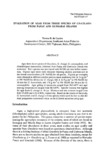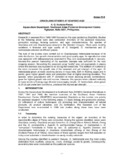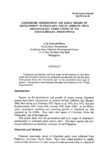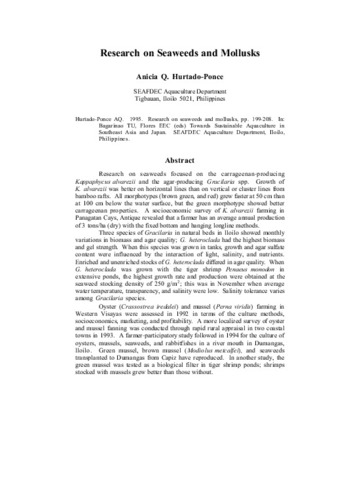Evaluation of agar from three species of Gracilaria from Panay and Guimaras islands
Share
Abstract
Agar from three species of Gracilaria, G. changii G. coronopifolia, and Gracilariopsis heteroclada, collected form Panay and Guimaras islands was evaluated. Each species was pretreated with NaOH solution before extraction. Highest agar yields were obtained following alkaline pretreatment at the lowest concentration (1% NaOH) for all species. Highest gel strengths were obtained at different alkaline pretreatment conditions: 644 ± 3.4 g cm-2 at 3 % NaOH for 60 min for G. changii, 641 ± 11.9 g cm-2 at 5 % NaOH for 30 min for G. heteroclada, and 170 g cm-2 at 5 % NaOH for 30 min G. coronopifolia. Agar gelling temperatures ranged from 38.5-40ºC and agar melting temperature ranged from 80.5-85 ºC. Specific viscosity was highest for agar from G. changii at 18 cps. Moisture and ash contents ranged from 8.04-15.20 % and 4.32-4.98%, respectively. Based on the result for this study, G. heteroclada and G. changii are two species which merit further studies for their prospective commercial value to the different industries using agar.
Suggested Citation
de Castro, T. R. (1993). Evaluation of agar from three species of Gracilaria from Panay and Guimaras islands. The Philippine Scientist , 30, 41-47. http://hdl.handle.net/10862/1412
Subject
Taxonomic term
Collections
- AQD Journal Articles [1214]
Related items
Showing items related by title, author, creator and subject.
-
Gracilaria studies at SEAFDEC/AQD
Hurtado-Ponce, Anicia Q. (Network of Aquaculture Centres in Asia-Pacific, 1996)Research in seaweed from 1988–1994 focused on the agar producing Gracilaria. Studies in the following areas were also conducted: inventory of the seaweed resources; production ecology; farming systems; and agar characterisation. ... -
Carpospore germination and early stages of development in Gracilaria edulis (Gmelin) Silva and Gracilaria rubra Chang et Xia (Gracilariales, Rhodophyta)
Hurtado-Ponce, Anicia Q. (San Carlos Publications, University of San Carlos, 1993)Carpospore germination and early stages of development in Gracilaria edulis and Gracilaria rubra of the Philippines are described for the first time. Both species follow the "Dumontia type" or the immediate discal type of ... -
Research on seaweeds and mollusks
Hurtado-Ponce, Anicia Q. (Aquaculture Department, Southeast Asian Fisheries Development Center, 1995)Research on seaweeds focused on the carrageenan-producing Kappaphycus alvarezii and the agar-producing Gracilaria spp. Growth of K. alvarezii was better on horizontal lines than on vertical or cluster lines from bamboo ...






